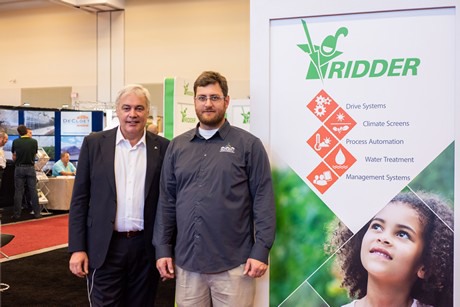The demand for horticultural products is high in Canada and the United States. In order to serve this growing market, greenhouse technology provider Ridder cooperates intensively with North American support group Acrobat Projects. “Engineering, design and installation of state-of-the art greenhouse projects requires skilled technicians. Those technicians are not always locally available in North America. Yet, it is for cost savings and many other reasons beneficial to have the work done by local installation contractors”, says Mark van den Ende with Acrobat Projects.
 Wil Lammers and Mark van den Ende during the Canadian Greenhouse Conference.
Wil Lammers and Mark van den Ende during the Canadian Greenhouse Conference.
The North American horticulture sector is growing rapidly. Not only has the market for medicinal cannabis increased dramatically in the last couple of years, there is also an increase in large commercial projects. And there is no end in sight for new technical developments, says Mark. "The square footage of greenhouses in North America per capita is still on a relatively small level when you consider what the demand for horticultural products and produce is and will be in the future.”
Local knowledge
Engineering, design and installation of state-of-the art greenhouse projects is not something anyone can manage, of course. The expanding industry therefore requires more and more skilled technicians. That is a challenge: the knowledge at local level is sometimes difficult to find.
A company like Ridder has to deal with this as well. Among other things, they supply computers for controlling climate, heating and irrigation. Acrobat Projects has been building the control panels for Ridder for a number of years, which transfers the input of the climate computer to the systems in the greenhouse. This cooperation has now been expanded to better support the players in the market. Mark explains: "For the North American market, we have become an extension of Ridder.”
Thorough preparations
The installation of the Ridder systems is prepared as much as possible at Acrobat in one central location, so that it can be sent to the job site as a complete customized solution. "They can be easily integrated into the local situation and also comply with the local laws and regulations", Mark explains. The local partners are also supported as much as possible by Acrobat. "We supply drawings with which the local installer can start immediately, even if they are not specialized in these types of systems. This has two major advantages. If the electrical and computer system needs to be installed by people from far away, there is a price tag attached to it. The use of local companies saves time and money. And with us, the customers also have a point of contact for small service matters. The involvement of local installation contractors is very important, especially for continued local technical support, after the project is commissioned."
Wil Lammers, Commercial Director at Ridder North America, says he is very satisfied with the collaboration with Acrobat Projects. "We have been working together for about eight years now, and it is going very well. In the specification of a new project, our specialists go to the table with them and the customer to make the right preparations. We do this for projects throughout North America.
Mark summarizes: “Basically, the experts at Ridder focus on product selections while the Acrobat Projects team add value to installation preparation to be executed by local contractors. Together we change from being a product supplier to handling more complete projects.”
For more information:
Acrobat Projects
Mark van den Ende
www.acrobatprojects.com
www.ridder.com
